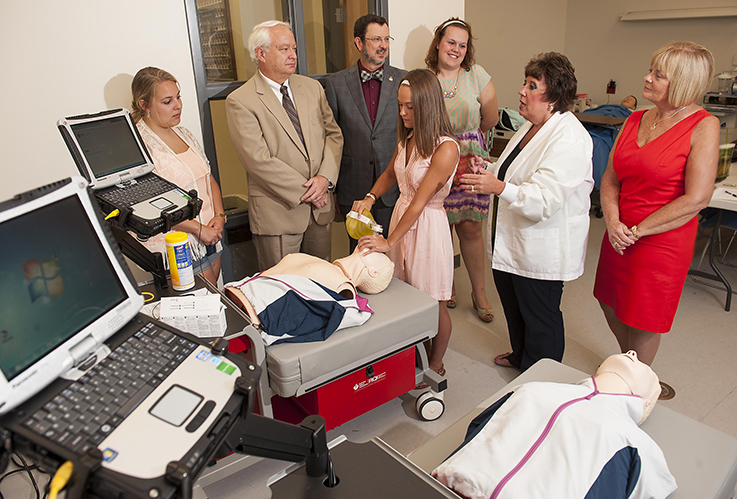Indiana University of Pennsylvania is one of nine schools of nursing chosen to participate in a national research study about cardiopulmonary resuscitation training.
The study, “Adaptive BLS Training: Optimizing Individual BLS Maintenance of Competence Training,” will involve 800 nursing students.
Done in collaboration with the Air Force Research Laboratory's 711th Human Performance Wing, this study aims to shift the one-size-fits-all approach to CPR training to a competency-based individualized training and practice. The site coordinator for IUP is Dr. Julia A. Greenawalt, a member of the Department of Nursing and Allied Health. Up to 200 IUP students (who must be CPR certified) are being sought to participate in the study.
“This is a great opportunity for IUP to be part of a national study, and can lead to additional opportunities, as well as new grant-funded programs,” Greenawalt said.
Each participant in the study is randomly assigned to one of four different types of CPR training: either for four consecutive days, once a week for four weeks, once a month for four months, or once a quarter for four quarters.
Participants will also receive a competency-based, individualized training and practice schedule using the Predictive Performance Optimizer (PPO). Students' retention of CPR skills will be assessed at different intervals after their training. In the PPO group, the training schedule is tailored based on individual needs. Training and reassessment involves real time audio and visual feedback provided by a practice mannequin.
The testing results will assess both the effectiveness of the training and the individual's learning style, Greenawalt said. In fact, the Air Force uses the PPO to predict the success of individuals who want to become fighter pilots.
Initial testing on the IUP campus will take place September 14 through October 2. Students will continue the testing over the next two years.
Study organizers noted that in a hospital setting, nurses are often the first responders to events that require CPR, so a nurse's ability to perform high quality CPR is vital to increasing the patient's chance of survival. Yet nurses in many clinical settings rarely use their CPR skills and may only practice them at the time of Basic Life Support course completion—typically every one to two years. Studies have documented that this limited practice is not enough to maintain competence in CPR skills.
The study is conducted by Dr. Marilyn Oermann from Duke University School of Nursing and is coordinated by Dr. Suzan Kardong-Edgren, Robert Morris University. It is sponsored by the National League for Nursing and Laerdal Medical.
 PHOTO INFORMATION: From left, nursing student Brooke Hoffman; IUP Provost Dr. Timothy Moerland, IUP President Dr. Michael Driscoll and nursing student Kaleigh Gilmer. In front, from left, are nursing student Kierra Guzzo; Dr. Julia Greenawalt, member of the Department of Nursing and Allied Health, explaining the Predictive Performance Optimizer, on loan to IUP for the study, and Dr. Mary Williams, acting associate dean, College of Health and Human Services.
PHOTO INFORMATION: From left, nursing student Brooke Hoffman; IUP Provost Dr. Timothy Moerland, IUP President Dr. Michael Driscoll and nursing student Kaleigh Gilmer. In front, from left, are nursing student Kierra Guzzo; Dr. Julia Greenawalt, member of the Department of Nursing and Allied Health, explaining the Predictive Performance Optimizer, on loan to IUP for the study, and Dr. Mary Williams, acting associate dean, College of Health and Human Services.